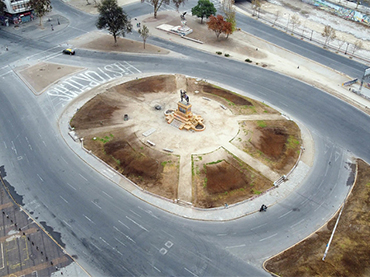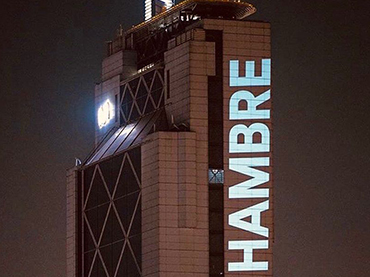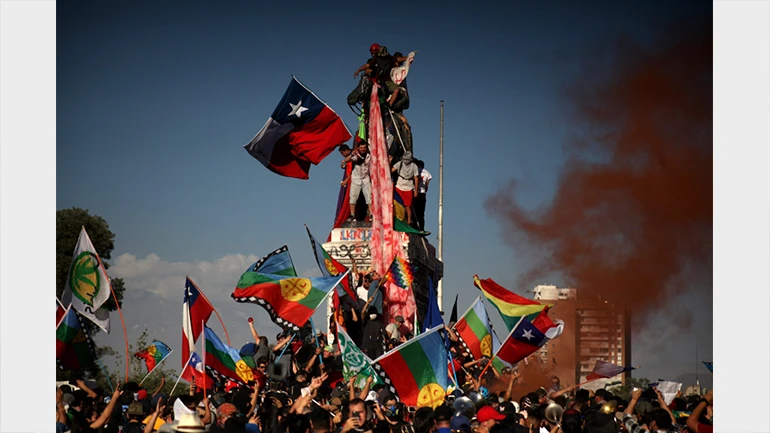-
21 September 2020 – 4pm
Session 1
“Chile Woke Up!”: The Complexities of Progression Interrupted by the Pandemic
In the wake of more than thirty years of democratic transition which left issues around social rights, memory and justice outstanding, the social unrest in October 2019 led citizens to scream: “Chile Woke Up!”. It did so by challenging the neoliberal order and imagining new horizons of social transformation.
This first session in the seminar prompts a review of the trance brought on by passing from the desire to re-establish a new democracy to the feeling of a future closed off by the uncertainty and misery of a fear-infected present. This fact alters the configurations of memory, the sensitive weft of bodies and human lives, ways of conceiving society and politics in its articulations with the State, and so on.
The pandemic has left the world hanging and withdrawn, its effects a reason to rethink new formulations and consider new ways of acting that give rise to solidarity practices which are able to regenerate intersubjective ties.

-
Monday, 28 September 2020 – 4pm
Session 2
Art in Times of Emergency
Over the past few decades, a far-reaching debate has been set out around the critical role of art and the capacity of artistic practices to question the relationship between social structures and power correlations, putting forward alternatives that defy the regime of signs set by capitalist rule. Art’s critical signs help us to take note of the effects of the symbolic closure exercised by the different systems of violence and political, economic and social control; as an emancipatory response, art invites a broadening of the limits of perception and consciousness that define the contours of a reality in conflict.
The seminar’s second session seeks to reflect on the artistic manifestations that, between social uprisings and the pandemic, put their strategies of ethical-political intervention to the test in a present besieged by multiple forms. To reflect on the dialogue and counterpoint between different strategies of artistic activism which concern memory, the action Not to Die of Hunger in Art, by the CADA collective (1979), and the intervention carried out by Delight Lab (2020), involving the projection of the word “Hambre (Hunger)” on the tallest building in Santiago de Chile in the middle of lockdown, will both be analysed.
Imaginaries of Revolt, Archive of Life, and Experience Reshaped from the Pandemic
Online seminar conducted by Nelly Richard

Held on 21 Sep 2020
Recent times have witnessed an outbreak of diverse social uprisings on a global scale (Hong King, Barcelona, Quito, Beirut, Bogotá, Santiago de Chile) to protest against the regime of inequality and social injustice established by neoliberal hegemony. The balance of the success or failure of these multiple attempts to obstruct the neoliberal system are yet to be gauged due to the pandemic caused by COVID-19, which has forced the entire planet to halt its rhythms and flows, bringing it to a near complete standstill.
In Chile, the uprising sparked in October 2019 unleashed an encouraging process shaped by the call for a Constituent Assembly, before the pandemic slowed its core drives right down. The result was a shift from mobilised collective energies to deserted cities and bodies stranded in the individual isolation of lockdown. This forced step, moving from the beat of something new to an unforeseen lack of motion, has led to questions related to how to reinterpret the archive of revolts — in Chile and other zones — considering the emotions and shocks the pandemic has etched into bodies to extract reserves of meaning from them and which orbit around instability.
Curator:
Nelly Richard
Force line:
Politics and Aesthetics of Memory
Organised by
Museo Reina Sofía
Education programme developed with the sponsorship of the Banco Santander Foundation

Participants
Nelly Richard is a theorist and essayist, and was founder and director of Revista de Crítica Cultural from 1990 to 2008 and director of the MA in Cultural Studies at the University of Art and Social Sciences (ARCIS) in Santiago (Chile) from 2006 to 2013. She has written a broad number of publications in Chile and internationally in relation to art, memory and the Chilean transition to democracy, for instance: Márgenes e Instituciones. Arte en Chile desde 1973 (Metales pesados, 1986, reissued in 2008); Masculino / Femenino. Prácticas de la diferencia y cultura democrática (Francisco Zegers Editor, 1993); La Insubordinación de los Signos (cambio político, transformaciones culturales y poéticas de la crisis) [conversación entre: Germán Bravo, Martín Hopenhayn, Nelly Richard, Adriana Valdés] (Cuarto Propio, 1994); Residuos y metáforas. Ensayos de crítica cultural sobre el Chile de la transición (Cuarto propio, 1998); Fracturas de la memoria. Arte y pensamiento crítico (Siglo veintiuno, 2007); Feminismo, género y diferencia(s) (Palinodia, 2008); Crítica de la memoria (Universidad Diego Portales, 2010); Crítica y política (Palinodia, 2013) and Diálogos latinoamericanos en las fronteras del arte (Ediciones udp, 2014). Furthermore, she curated the Chilean Pavilion at the 56th Venice Biennale in 2015, under the title Poetics of Dissent: Paz Errázuriz — Lotty Rosenfeld. Since 2019, she has coordinated the force line Politics and Aesthetics of Memory, inside the framework of the Museo Reina Sofía’s Public Activities Department.
Más actividades

Difficulty. Forms and Political Effects of Deviation in Writing and Contemporary Art
23 February – 14 December 2026 – Check programme
Difficulty. Forms and Political Effects of Deviation in Writing and Contemporary Art is a study group aligned towards thinking about how certain contemporary artistic and cultural practices resist the referentiality that dominates the logics of production and the consumption of present-day art. At the centre of this proposal are the concepts of difficulty and deviation, under which it brings together any procedure capable of preventing artistic forms from being absorbed by a meaning that appears previous to and independent from its expression. By ensuring the perceptibility of their languages, difficulty invites us to think of meaning as the effect of a signifying tension; that is, as a productive and creative activity which, from the materiality of art objects, frees aesthetic experience from the representational mandate and those who participate in it from the passiveness associated with tasks of mimesis and decoding.
The economy of the referential norm translates the social logic of capitalism, where insidious forms of capturing subjectivity and meaning operate. In the early 1980s, and adopting a Marxist framework, poet Ron Silliman highlighted how this logic entailed separating language from any mark, gesture, script, form or syntax that might link it to the conditions of its production, rendering it fetichised (as if without a subject) and alienating its users in a use for which they are not responsible. This double dispossession encodes the political strategy of referential objectivity: with no subject and no trace of its own consistency, language is merely an object, that reality in which it disappears.
The political uses of referentiality, more sophisticated today than ever before, sustain the neoliberal-extractivist phase of capitalism that crosses through present-day societies politically, economically and aesthetically. Against them, fugitive artistic practices emerge which, drawing from Black and Queer studies and other subaltern critical positions, reject the objective limits of what exists, invent forms to name what lies outside what has already been named, and return to subjects the capacity to participate in processes of emission and interpretation.
Read from the standpoint of artistic work, the objective capture of referentiality may be called transparency. Viewed from a social contract that reproduces inequality in fixed identity positions, transparent in this objectivity are, precisely, the discourses that maintain the status quo of domination. Opposite the inferno of these discourses, this group aims to collectively explore, through deviant or fugitive works, the paradise of language that Monique Wittig encountered in the estranged practices of literature. For the political potency of difficulty — that is, its contribution to the utopia of a free language among equals — depends on making visible, first, its own deviations; from there, the norm that those deviations transgress; and finally, the narrowness of a norm which in no way exhausts the possibilities ofsaying, signifying, referring and producing a world.
From this denouncement of referential alienation, fetishisation and capture, Difficulty. Forms and Political Effects of Deviation in Writing and Contemporary Art turns its attention to the strategies of resistance deployed by contemporary artists and poets. Its interest is directed towards proposals as evidently difficult or evasive as those of Gertrude Stein, Lyn Hejinian, Theresa Hak Kyung Cha, Kameelah Janan Rasheed, Kathy Acker, María Salgado and Ricardo Carreira, and as seemingly simple as those of Fernanda Laguna, Felix Gonzalez Torres and Cecilia Vicuña, among other examples that can be added according to the desires and dynamics of the group.
The ten study group sessions, held between February and December, combine theoretical seminars, work with artworks from the Museo Reina Sofía’s Collections and exhibitions, reading workshops and public programs. All these formats serve as spaces of encounter to think commonly about certain problems of poetics — that is, certain political questions — of contemporary writing and art.
Difficulty. Forms and Political Effects of Deviation in Writing and Contemporary Art inaugurates the research line Goodbye, Representation, through which the Museo Reina Sofía’s Studies Directorship seeks to explore the emergence of contemporary artistic and cultural practices which move away from representation as a dominant aesthetic-political strategy and redirect their attention toward artistic languages that question the tendency to point, name and fix, advocating instead for fugitive aesthetics. Over its three-year duration, this research line materializes in study groups, seminars, screenings and other forms of public programming.

Institutional Decentralisation
Thursday, 21 May 2026 – 5:30pm
This series is organised by equipoMotor, a group of teenagers, young people and older people who have participated in the Museo Reina Sofía’s previous community education projects, and is structured around four themed blocks that pivot on the monstrous.
This fourth and final session centres on films that take the museum away from its axis and make it gaze from the edges. Pieces that work with that which is normally left out: peripheral territories, unpolished aesthetics, clumsy gestures full of intent. Instead of possessing an institutional lustre, here they are rough, precarious and strange in appearance, legitimate forms of making and showing culture. The idea is to think about what happens when central authority is displaced, when the ugly and the uncomfortable are not hidden, when they are recognised as part of the commons. Film that does not seek to be to one’s liking, but to open space and allow other ways of seeing and inhabiting the museum to enter stage.

Intergenerationality
Thursday, 9 April 2026 – 5:30pm
This series is organised by equipoMotor, a group of teenagers, young people and older people who have participated in the Museo Reina Sofía’s previous community education projects, and is structured around four themed blocks that pivot on the monstrous.
The third session gazes at film as a place from which to dismantle the idea of one sole history and one sole time. From a decolonial and queer perspective, it explores films which break the straight line of past-present-future, which mix memories, slow progress and leave space for rhythms which customarily make no room for official accounts. Here the images open cracks through which bodies, voices and affects appear, disrupting archive and questioning who narrates, and from where and for whom. The proposal is at once simple and ambitious: use film to imagine other modes of remembering, belonging and projecting futures we have not yet been able to live.

Remedios Zafra
Thursday March 19, 2026 - 19:00 h
The José Luis Brea Chair, dedicated to reflecting on the image and the epistemology of visuality in contemporary culture, opens its program with an inaugural lecture by essayist and thinker Remedios Zafra.
“That the contemporary antifeminist upsurge is constructed as an anti-intellectual drive is no coincidence; the two feed into one another. To advance a reactionary discourse that defends inequality, it is necessary to challenge gender studies and gender-equality policies, but also to devalue the very foundations of knowledge in which these have been most intensely developed over recent decades—while also undermining their institutional support: universities, art and research centers, and academic culture.
Feminism has been deeply linked to the affirmation of the most committed humanist thought. Periods of enlightenment and moments of transition toward more just social forms—sustained by education—have been when feminist demands have emerged most strongly. Awareness and achievements in equality increase when education plays a leading social role; thus, devaluing intellectual work also contributes to harming feminism, and vice versa, insofar as the bond between knowledge and feminism is not only conceptual and historical, but also intimate and political.
Today, antifeminism is used globally as the symbolic adhesive of far-right movements, in parallel with the devaluation of forms of knowledge emerging from the university and from science—mistreated by hoaxes and disinformation on social networks and through the spectacularization of life mediated by screens. These are consequences bound up with the primacy of a scopic value that for some time has been denigrating thought and positioning what is most seen as what is most valuable within the normalized mediation of technology. This inertia coexists with techno-libertarian proclamations that reactivate a patriarchy that uses the resentment of many men as a seductive and cohesive force to preserve and inflame privileges in the new world as techno-scenario.
This lecture will address this epochal context, delving into the synchronicity of these upsurges through an additional parallel between forms of patriarchal domination and techno-labor domination. A parallel in which feminism and intellectual work are both being harmed, while also sending signals that in both lie emancipatory responses to today’s reactionary turns and the neutralization of critique. This consonance would also speak to how the perverse patriarchal basis that turns women into sustainers of their own subordination finds its equivalent in the encouraged self-exploitation of cultural workers; in the legitimation of affective capital and symbolic capital as sufficient forms of payment; in the blurring of boundaries between life and work and in domestic isolation; or in the pressure to please and comply as an extended patriarchal form—today linked to the feigned enthusiasm of precarious workers, but also to technological adulation. In response to possible resistance and intellectual action, patriarchy has associated feminists with a future foretold as unhappy for them, equating “thought and consciousness” with unhappiness—where these have in fact been (and continue to be) levers of autonomy and emancipation.”
— Remedios Zafra

27th Contemporary Art Conservation Conference
Wednesday, 4, and Thursday, 5 March 2026
The 27th Contemporary Art Conservation Conference, organised by the Museo Reina Sofía’s Department of Conservation and Restoration, with the sponsorship of the Mapfre Foundation, is held on 4 and 5 March 2026. This international encounter sets out to share and debate experience and research, open new channels of study and reflect on conservation and the professional practice of restorers.
This edition will be held with in-person and online attendance formats, occurring simultaneously, via twenty-minute interventions followed by a five-minute Q&A.

